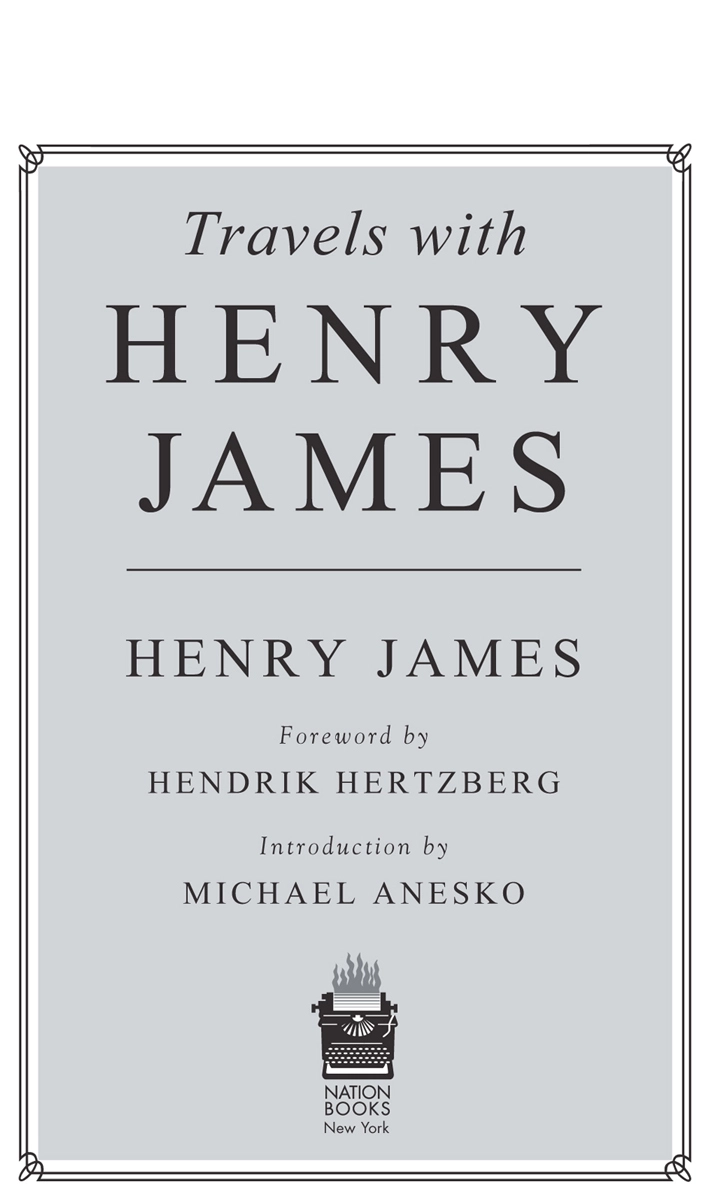Travels with Henry James

Copyright © 2016 by Nation Books
Published by Nation Books, an imprint of Perseus Books, LLC,
a subsidiary of Hachette Book Group, Inc. 116 East 16th Street, 8th Floor,
New York, NY 10003
Nation Books is a co-publishing venture of the Nation Institute and Perseus Books
All rights reserved. Printed in the United States of America. No part of this book may be reproduced in any manner whatsoever without written permission except in the case of brief quotations embodied in critical articles and reviews. For information, address the Perseus Books Group, 250 West 57th Street, 15th Floor, New York, NY 10107.
Books published by Nation Books are available at special discounts for bulk purchases in the United States by corporations, institutions, and other organizations. For more information, please contact the Special Markets Department at the Perseus Books Group, 2300 Chestnut Street, Suite 200, Philadelphia, PA 19103, or call (800) 810-4145, ext. 5000, or e-mail special. [email protected].
Designed by Trish Wilkinson
The photograph of Henry James on the jacket was taken from the frontispiece of Short Story Classics (American), Volume Three, ed. William Patten, copyright © 1905, printed by P.F. Collier & Son. Photographer unknown. Wikimedia.
A CIP catalog record for this book is available from the Library of Congress.
ISBN: 978-1-56858-578-9 (e-book)
10 9 8 7 6 5 4 3 2 1
CONTENTS

Foreword, by Hendrik Hertzberg
Introduction: A Little Tour with Henry James, by Michael Anesko
Saratoga
Lake George
From Lake George to Burlington
Newport
Niagara
A European Summer: Lichfield and Warwick
A European Summer: North Devon
A European Summer: Wells and Salisbury
A European Summer: From Chambery to Milan
The Parisian Stage
A European Summer: From Venice to Strassburg
The After-Season at Rome
Homburg Reformed
An Ex-Grand-Ducal Capital
Autumn in Florence
Tuscan Cities
Ravenna
London Sights
London in the Dead Season
In Scotland
The London Theatres
Illustration Credits
Index
FOREWORD

Hendrik Hertzberg
HENRY JAMES WAS A COCKSURE FREELANCER OF TWENTY-TWO when he published, in the November 16, 1865, issue of a four-month-old weekly called The Nation, one of American literature’s most notorious pans.a He judged a book he anonymously reviewed—Drum-Taps, a collection of what he dismissed as “spurious poetry”—“an offense against art,” “clumsy,” “monstrous,” devoid of “common sense,” and “aggressively careless, inelegant, and ignorant.” Having laid the groundwork, the future author of The Portrait of a Lady, Daisy Miller, The Ambassadors, The Golden Bowl, The Turn of the Screw, and much, much more, proceeded to address himself directly to the offending versifier, scolding him as follows: “To become adopted as a national poet, it is not enough to discard everything in particular and to accept everything in general, to amass crudity upon crudity, to discharge the undigested contents of your blotting-book into the lap of the public. You must respect the public you address; for it has taste, if you have not. . . . It is not enough to be rude, lugubrious, and grim. You must also be serious.”
Forgive him. He was young and full of beans. In time, of course, Henry James would change his mind about Walt Whitman—so much so that by 1904, he and Edith Wharton were spending long evenings joyously reading to each other from Leaves of Grass. (As James read, Wharton would recall, “his voice filled the hushed room like an organ adagio,” and he exclaimed, “Oh, yes, a great genius, undoubtedly a very great genius!”b) At about the same time, in a letter to a friend who had teased him about that long-ago review, he was theatrically contrite. It was a “disgrace,” he lamented, a “little atrocity” that he had “perpetrated [on Whitman] in the gross impudence of youth.” He added, “I only know that I haven’t seen the accursed thing for more than thirty years, and that if it were to cross my path nothing would induce me to look at it. I am so far from ‘keeping’ the abominations of my early innocence that I destroy them whenever I spy them—which, thank goodness, occurs rarely.”c
Thank goodness the mature James was in no position to destroy his youthful abominations, none of which, by the way, were abominable. (Even his rash demolition of Whitman crackles with thrilling exuberance.) The travel pieces collected here make the case. Besides being delightful in their own right, these youthful nonabominations are important for what they presage. They are among the first stirrings of a great career with few parallels among American and British writers—or among writers of any nationality, for that matter—of the period between the American Civil War and World War I. (For literature, the Gilded Age was twenty-four-carat gold.)
Samuel Johnson’s immortal wisecrack—“No man but a blockhead ever wrote, except for money”—didn’t apply to Henry James. Not quite, anyway. Strictly speaking, James didn’t “need” money. His father, Henry James Sr., had inherited the equivalent today of some $8 million and was generally willing to supply a letter of credit whenever one of his children was short of ready cash.
1 comment